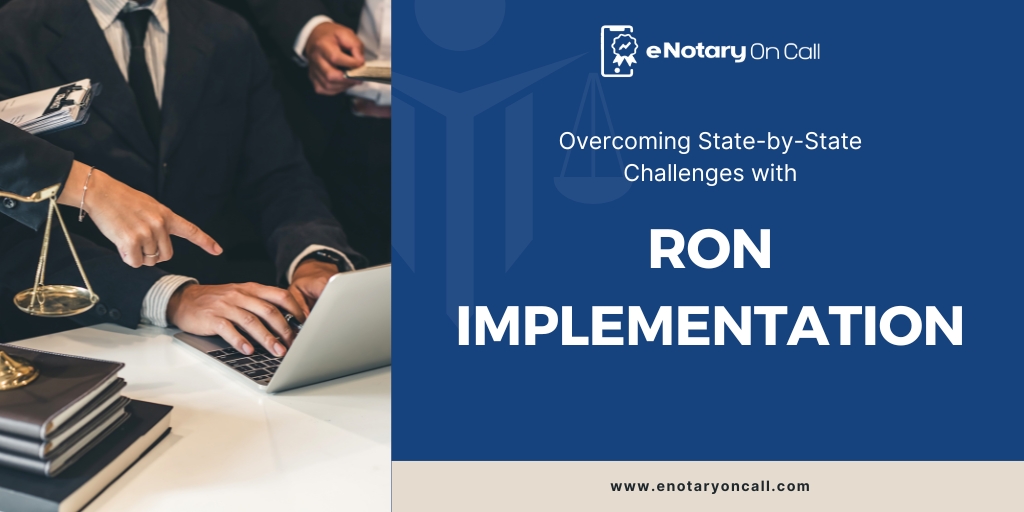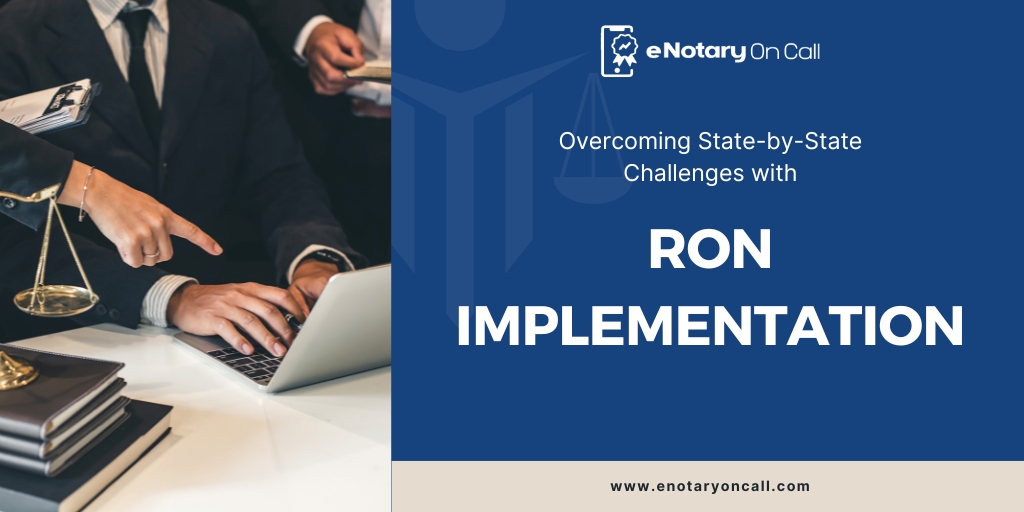
Have you ever wondered how notarization has evolved in the digital age?
Remote Online Notarization has emerged as a groundbreaking solution, allowing virtual notarization of documents. In this era, digital solutions for everything have become a demand. Remote notarization is becoming increasingly important for businesses and individuals, and it is continuously rising.
However, the journey to widespread adoption has its challenges. The implementation of online notarzation in States is complicated by the diverse regulations and legal frameworks that vary from state to state. Consequently, it is difficult for businesses to achieve seamless nationwide operations.
In this blog, we will explore these challenges and provide practical insights on navigating and overcoming the complexities of remote online notary service providers’ implementation across different states.
Did you know
30% of notarial acts were completed using RON during the COVID-19 pandemic, highlighting its importance in maintaining continuity in legal and financial transactions
A Brief Overview Of RON
It is a modern advancement in the notarization process that enables the notarization of documents using digital platforms and secure video conferencing tools.
With it signers and notaries can interact in real-time over the internet, with the notary verifying the identity of the signer and witnessing the signing of documents remotely.
Advantages of RON:
- Convenience: Online notary eliminates the need for physical meetings, allowing parties to complete notarizations from the comfort of their homes or offices, regardless of their geographic location.
- Security: Utilizing advanced encryption and digital signature technologies, virtual notarization ensures that documents are securely handled and tamper-proof, safeguarding the integrity of the notarization process.
- Efficiency: By streamlining the notarization process, a platform related to online notary services reduces delays and administrative burdens, speeding up transactions and improving overall workflow.
Current Adoption: While this has gained traction across many states, its adoption remains uneven due to differing state regulations and legislative support. Some states have fully embraced such notarization platforms, integrating it into their legal framework, while others are still establishing or updating their laws to accommodate this digital notarization method.
State-by-State Legal Variations
Adopting Remote Online Notarization (RON) in the United States is characterized by a complex web of state-specific regulations, significantly impacting its implementation and usage.
Each state has crafted its own set of rules governing remote notarization, resulting in a patchwork of legal requirements that vary widely. For instance, some states, such as California and Texas, have well-established frameworks, including detailed technology standards and security measures guidelines. In contrast, other states are still developing or updating their regulations to address RON.
Diverse Regulations: The differences in state regulations include variations in notarization laws, technology requirements, and privacy concerns. For example, while some states require notaries to use specific software platforms or adhere to stringent encryption standards, others may have more lenient requirements or do not yet specify technology needs. Additionally, privacy regulations can differ, with some states mandating strict data protection protocols to ensure the confidentiality of electronic communications and documents.
Compliance Requirements: To avoid legal complications, businesses must navigate these state-specific regulations carefully. Compliance with each state’s rules is crucial, as failing to meet regulatory requirements can lead to invalid notarizations and potential legal disputes. Businesses offering RON services need to stay abreast of changing laws and ensure that their operations are aligned with the most current requirements in each jurisdiction.
Impact on Businesses: These variations pose significant challenges for the nationwide implementation of RON. Companies must invest in flexible, adaptable technologies and legal expertise to manage the diverse regulatory landscape. This fragmentation can increase operational costs and complicate the scalability of RON services across state lines, ultimately affecting the efficiency and reach of businesses operating in the digital notarization space.
Critical Challenges in RON Implementation
Regulatory Hurdles
Implementing Remote Online Notarization (RON) across different states presents significant regulatory challenges. Each state in the U.S. has its own set of laws and regulations governing RON, making it difficult for businesses to create a one-size-fits-all approach. Staying compliant requires not only an in-depth understanding of state-specific regulations but also a constant effort to keep up with any legal changes. This complexity can lead to delays in implementation and increases the risk of non-compliance, which can result in legal consequences.
Technology Integration
Another significant challenge is the integration of the necessary technology to facilitate RON. Secure video conferencing tools, digital identity verification systems, and electronic signature software must all meet stringent security and privacy standards. However, these technologies may not be uniformly compatible across different states, which can complicate the integration process. Additionally, ensuring that all parties involved in the notarization process have access to and can effectively use the required technology can be a hurdle, particularly in regions with limited digital infrastructure.
Cross-State Notarization
Cross-state notarization adds another layer of complexity to RON implementation. Notarizing documents across state lines can be tricky, especially when states have different recognition standards for RON. Some states may not accept notarizations performed in other states, which can cause legal complications and delay transactions. Businesses must navigate these differences to ensure that notarized documents are legally binding in all relevant jurisdictions.
Strategies to Overcome RON Challenges
Staying Informed
The landscape of Remote Online Notarization (RON) is continuously evolving, with state-specific laws and regulations frequently being updated. To overcome the challenges posed by these regulatory changes, it’s essential to stay informed. Subscribe to industry newsletters, join professional associations, and regularly review state government websites for the latest updates. Leveraging online platforms that track legal changes across states can also be beneficial, ensuring that your practices remain compliant.
Leveraging Technology
Adopting technology solutions that are both flexible and compliant is crucial in overcoming RON’s technical challenges. Choose platforms that offer secure video conferencing, digital identity verification, and e-signature capabilities while being adaptable to different state requirements. Investing in scalable technology that can be easily updated to meet new regulatory standards will help ensure long-term compliance and smooth operations across state lines.
Working with Legal Experts
Navigating the complex legal landscape of RON is challenging, making it essential to consult with legal professionals who specialize in this area. Legal experts can provide invaluable guidance on state-specific requirements, helping you avoid potential pitfalls. Their expertise ensures that your RON practices are legally sound and that you’re well-prepared to handle any regulatory challenges that arise.
Collaboration with Notaries
Collaborating with notaries who are well-versed in their state’s RON laws can significantly reduce the risk of errors and non-compliance. Notaries familiar with the local regulations can offer insights and practical advice, helping to ensure that the notarization process is both efficient and legally compliant. This collaboration can be particularly useful when dealing with cross-state notarizations.
Future of RON and Nationwide Standardization
Progress Towards Uniformity
As Remote Online Notarization (RON) continues to grow in popularity, there are ongoing efforts to create a more standardized approach to its implementation across states. Organizations such as the National Notary Association and the Uniform Law Commission are working towards the adoption of uniform RON laws to streamline processes and reduce the complexities associated with state-by-state regulations. This push for uniformity is expected to make RON more accessible and efficient for businesses and consumers alike.
Potential Legislative Changes
Upcoming legislative efforts are focusing on easing the regulatory disparities between states. The introduction of federal legislation, such as the SECURE Notarization Act, aims to create a nationwide framework for RON, which would simplify cross-state notarizations and enhance legal clarity. This legislation could significantly reduce the challenges currently faced by businesses in navigating the varied state laws.
The Role of Technology in the Future
Technological advancements are poised to play a crucial role in the future of RON, making implementation and compliance more straightforward. Innovations in blockchain, artificial intelligence, and enhanced encryption methods could lead to more secure and efficient notarization processes, helping to meet regulatory standards seamlessly across different states. As technology evolves, it will likely drive further adoption and standardization of RON nationwide.
Successfully implementing Remote Online Notarization (RON) hinges on overcoming the challenges posed by varying state regulations, technology integration, and cross-state notarizations. By staying informed about state-specific laws, adopting flexible and compliant technology solutions, and working closely with legal experts and experienced notaries, businesses can navigate the complex RON landscape effectively.
As RON continues to evolve, staying ahead of the curve is crucial. I encourage you to keep up with the latest developments, consult with RON specialists, and invest in adaptable technology to ensure your business remains compliant and competitive. Embrace these strategies to unlock the full potential of RON and position your business for long-term success.
Conclusion
Successfully implementing Remote Online Notarization (RON) hinges on overcoming the challenges posed by varying state regulations, technology integration, and cross-state notarizations. By staying informed about state-specific laws, adopting flexible and compliant technology solutions, and working closely with legal experts and experienced notaries, businesses can navigate the complex RON landscape effectively.
As RON continues to evolve, staying ahead of the curve is crucial. Keep up with the latest developments, consult with RON specialists, and invest in adaptable technology to ensure your business remains compliant and competitive. Embrace these strategies to unlock the full potential of RON and position your business for long-term success.
FAQS
1. What are the primary state-by-state challenges in implementing Remote Online Notarization (RON)?
The main challenges include varying state laws, differing security and technology standards, and the requirement for notaries to be physically located in the state where they are commissioned, even when performing online notarizations. This lack of uniformity can create confusion and limit the widespread adoption of RON.
2. How can businesses overcome the inconsistent RON regulations across states?
Businesses can overcome these challenges by adopting platforms that comply with the strictest state regulations, thus ensuring broader usability. Partnering with legal experts to navigate varying state laws and advocating for the adoption of standardized RON legislation can also help streamline implementation.



